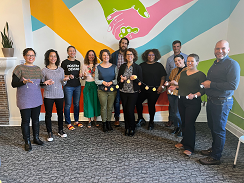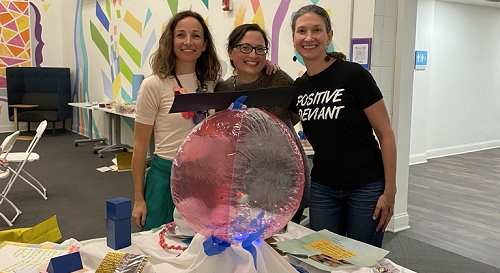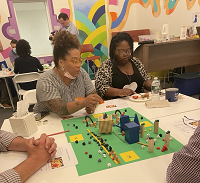Luminosity Collaborative: A Case Study In Innovating For Systems Change
By Claire Reid, United Way of the Greater Capital Region
Systemic problems - poverty, homelessness, hunger, racism, maternal mortality - need systemic solutions. And yet conventional philanthropic funding is focused on short-term, particular solutions. What’s more, the needs are ever-growing and we cannot fundraise our way out of it. Collectively, we need to do something different. Since traditional philanthropy is focused on the particular and short-term, we need to change the model. We must engage in systems.
Yet, community activists and the non-profit sector, struggling to meet ever-growing needs, lack the resources to engage in systems work. When we surveyed our communities, we were struck by the common feeling expressed: “There is no time to think.” Nonprofit organizations, long under-resourced, are constantly putting out fires.
At the same time, while philanthropy is increasingly recognizing the need to focus on outcomes, the dominant approach remains focused on short-term results, assumes that an organization controls all the inputs, and looks for “proof of concept” prior to investing resources. The solution or results mindset stifles innovation and is biased towards those larger organizations able to front the costs.
This is why United Way of the Greater Capital Region created Luminosity Collaborative. The idea is to open up and fund space for non-profit organizations to have time to think and build skills and offer tools necessary for systems work: to raise systems questions and, working together, come up with systems solutions.
The private sector relies on R&D to develop, grow and innovate – in spite of its risks. Likewise, Luminosity works, if you like, as an R&D for the non-profit. After all, when it comes to seemingly entrenched problems, maintaining the status quo is also a risk.
“How might we create and hold space to explore early ideas with transformative potential?”
“What if we could intentionally cultivate a system that actively and equitably nurtures social innovations?”
"What would it look like to innovate the funding model itself to root it in solidarity and transparency?
These are the questions at the heart of the Luminosity Collaborative. We launched in 2021 with an initial financial contribution from Bank of America and grant funds from Mackenzie Scott. Our goal is to hold space for early-stage ideas with transformative potential and curate a space for shared learning and application of systems change efforts.
How it Works
Luminosity Collaborative offers a six-month funded fellowship and seed grant for early-stage ideas with transformative potential. We focus on the kinds of questions leaders are asking rather than the traditional focus on programmatic best practices. In its first iteration, Luminosity Collaborative brought together 11 innovative leaders from across our eight-county footprint.
The fellowship is not a pre-determined systems thinking syllabus. Rather, it develops iteratively, incorporating action learning, design thinking, play-based learning, and case clinics. Threaded throughout is the essential interplay between learning, unlearning, and relearning.
We incorporate participatory budgeting to collectively source ideas, non-financial resources, and distribute equally the decision-making for financial allocations. Through participatory budgeting we aim to normalize what collectively resourcing social change efforts could look like if we replaced zero-sum thinking and generated resources and ideas collectively.
Ultimately, we invested $200K in the further evolution of two ideas proposed by fellows. We are engaged in adaptive cycle evaluation with these partners, a process better suited to understanding long-term systemic change than traditional results-based management. In this way, we aim to model how we might better understand and track for systemic change work.
As we prepare for Luminosity’s second iteration, our evolved focus is on how best to support and connect many localized changes that are happening simultaneously with the goal of developing new powerful systems for change. Focusing on collaborative efforts is key, we believe because transformative social change is only possible through the coordinated contributions and dedication of many people and organizations from multiple sectors. Operating within the confines of a single organization is often insufficient to create widespread, lasting change.
Tackling Systemic Challenges
“How might we expand our knowledge of health equity?”
“What if we could address the long-standing problem of no public transportation in our community?”
Two of our fellows asked, separately, these two questions. In Luminosity, they gained insight into how the challenges of each, seemingly disparate, were, in fact, connected. Collaboratively, their work advances health equity through transportation. A lack of transportation in this predominantly rural county is a decades-long, seemingly unsolvable problem that predominantly impacts low-income residents. Seeing affordable, accessible transportation as essential to health equity has propelled their work. They have designed and hired for unique community coach positions to help residents inform and navigate the practices implemented. They are developing a pilot transportation strategy that involves the local transportation authority, hospital, employers and nonprofit sector. As one of the fellows with decades working in the health system said, “This experience changed how I think about health care.”
“How might we tackle the barriers to food access created by white supremacy?” another fellow asked. Luminosity held space for collaborative problem-solving and developing skills such as generic parts thinking. They created a network of community free food fridges for people to access anonymously. These fridges are the embodiment of solidarity as a foundation for food equity. With another fellow, they implemented the first solar-powered free food fridge and will soon launch a mobile “fridge.” Increasingly, corporate partners, farms, restaurants, individual community members and nonprofits are caring for and stocking the fridges. UWGCR’s investment supports their ongoing monumental effort to shift mindsets away from food as a private commodity to food as a public good. Shifting mindsets is perhaps the hardest part of systems work. This innovation is less about providing an alternative to pantries or grocery stores than it is about demonstrating what a food system grounded in mutual aid could look like.

